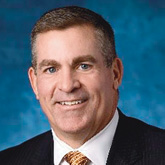As part of fulfilling its mission of Making Communities Healthier, the team at LifePoint Health is committed to anticipating and planning for the unexpected.

When news of the coronavirus broke early last year, the organization began monitoring the situation and taking the steps necessary to ensure its facilities were prepared to provide quality care while also protecting the health and safety of the patients, employees, providers, volunteers and visitors in each of the communities its 88 hospitals serve. A critical part of LifePoint’s pandemic response has been the efforts of its supply chain team, led by Jay Kirkpatrick, Vice President of Supply Chain Operations.
At the outset
“Initially, we had no backup inventory or any kind of pandemic stockpile outside of what individual facilities might have had as part of their own emergency response inventory,” Kirkpatrick shares. “From the beginning, a centralized approach was decided on, so we didn’t have 88 hospitals going in just as many different directions. Supply chain coordination at the company level ensured that facilities had the products they needed and kept them from situations where they had to purchase products at extreme markups or source them from suppliers with no previous track record in the market, whose quality and safety claims needed to be vetted.”
Who can you trust?
LifePoint relied heavily on the account management and strategic sourcing assistance offered by HealthTrust—especially the supplier and product vetting processes. “As the pandemic spread rampantly in New York and supply disruptions became extremely apparent, predatory pricing kicked in. At the same time,” Kirkpatrick says, “I was probably receiving in the neighborhood of 150 emails a day from suppliers, brokers or vendors who came out of the woodwork claiming to have N95 masks, gowns and other types of scarce PPE.
“From a safety perspective, there was no way to know the origin of the products or if they had gone through all of the regulatory agency approvals to ensure they’d protect our staff. Some of these suppliers even wanted cash up front.
“HealthTrust did a fantastic job helping us vet whether or not a supplier was reputable and if its products met required safety standards,” he shares. “Account Management at HealthTrust worked with us to get product orders placed efficiently. It was a much more effective process than anything we could have done on our own.”
After the height of the initial surges, LifePoint not only began building a strategic stockpile in the Nashville area, but it also worked with its 88 facilities to ensure that all have a specified level of inventory available across a core set of items.
“The pandemic response has really shown me the strength of our supply chain team. From the workload taken on to standing up a warehouse to house our strategic inventory, the team went above and beyond anything I could have imagined,” Kirkpatrick says. “Their efforts resonated throughout the organization, and I’m proud to say that leadership and other staff appreciate the supply chain team that stepped up and did an amazing job.”
To listen to a related podcast with Kirkpatrick, visit Supply Chain Protocols & Adoption.
Share Email COVID-19, Q1 2021





